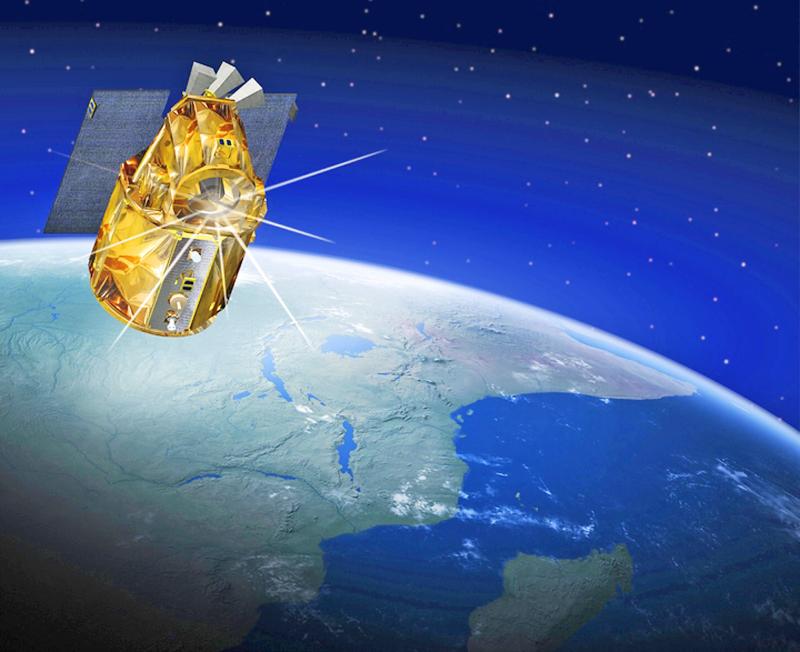Taiwan’s plan to issue licenses for the delivery of low Earth orbit (LEO) satellite services is a major strategic move for the country and would create great business opportunities for relevant industries, analysts said.
For example, if Taiwan’s underground and undersea fiber optics were damaged during a war, LEO satellites, which normally operate below an altitude of 2,000km, could be a powerful tool for the military, Digitimes research analyst Ashley Huang (黃雅芝) said in a telephone interview.
There is evidence of the value of LEO satellites in wartime, for example Ukraine’s effective use of LEO data in the war against Russia, Huang said.

Photo courtesy of the National Space Organization
In addition to the satellites’ strategic value to a nation, they also have the potential to boost the satellite phone market, which would generate new business opportunities under Taiwan’s plan to issue LEO satellite licenses to domestic telecoms, Huang said.
Universal Microwave Technology Inc (昇達科技), a leading Taiwanese supplier of millimeter-wave passive components to international space companies, said it is eager to see the launch of the LEO satellite business in Taiwan, as it is aiming to venture into the satellite component market.
If the government decides to accept license applications from global LEO satellite service providers, major companies such as Space Exploration Technologies Corp, Telesat Corp, OneWeb Ltd and Amazon.com Inc are likely to apply, Universal Microwave Technology said.
Meanwhile, two Taiwan-based companies have expressed interest in the emerging LEO communications market: Auden Techno Corp (耀登科技), a supplier of wireless local-area network antenna and radio frequency technology products, and Accton Technology Corp (智邦科技), a leading provider of networking solutions.
The National Communications Commission in March approved draft rules for the appropriation and assignment of radio frequency bands for satellite communications, paving the way for license applications from telecoms to provide LEO satellite services.
To be eligible to obtain such licenses, telecoms must be registered in Taiwan and managed by Taiwanese, the commission said.
However, foreign operators can form partnerships with Taiwanese companies to apply for the licenses, it said.
Market researcher TrendForce Corp (集邦科技) said in a report released last year that LEO satellites’ signal coverage is not constrained by geographical features, such as mountains, oceans and deserts, which means they can synergize with 5G mobile communications to reach areas that lack 5G coverage.
In the global satellite market, LEO satellites also have the greatest developmental potential, given their proximity to Earth and their relatively lower latency, radiation and cost compared with high Earth orbit and medium Earth orbit satellites, TrendForce said.
It forecast that the global satellite industry would generate revenue of US$295 billion this year, an annual increase of 3.3 percent.

Sweeping policy changes under US Secretary of Health and Human Services Robert F. Kennedy Jr are having a chilling effect on vaccine makers as anti-vaccine rhetoric has turned into concrete changes in inoculation schedules and recommendations, investors and executives said. The administration of US President Donald Trump has in the past year upended vaccine recommendations, with the country last month ending its longstanding guidance that all children receive inoculations against flu, hepatitis A and other diseases. The unprecedented changes have led to diminished vaccine usage, hurt the investment case for some biotechs, and created a drag that would likely dent revenues and

Macronix International Co (旺宏), the world’s biggest NOR flash memory supplier, yesterday said it would spend NT$22 billion (US$699.1 million) on capacity expansion this year to increase its production of mid-to-low-density memory chips as the world’s major memorychip suppliers are phasing out the market. The company said its planned capital expenditures are about 11 times higher than the NT$1.8 billion it spent on new facilities and equipment last year. A majority of this year’s outlay would be allocated to step up capacity of multi-level cell (MLC) NAND flash memory chips, which are used in embedded multimedia cards (eMMC), a managed

CULPRITS: Factors that affected the slip included falling global crude oil prices, wait-and-see consumer attitudes due to US tariffs and a different Lunar New Year holiday schedule Taiwan’s retail sales ended a nine-year growth streak last year, slipping 0.2 percent from a year earlier as uncertainty over US tariff policies affected demand for durable goods, data released on Friday by the Ministry of Economic Affairs showed. Last year’s retail sales totaled NT$4.84 trillion (US$153.27 billion), down about NT$9.5 billion, or 0.2 percent, from 2024. Despite the decline, the figure was still the second-highest annual sales total on record. Ministry statistics department deputy head Chen Yu-fang (陳玉芳) said sales of cars, motorcycles and related products, which accounted for 17.4 percent of total retail rales last year, fell NT$68.1 billion, or

In the wake of strong global demand for AI applications, Taiwan’s export-oriented economy accelerated with the composite index of economic indicators flashing the first “red” light in December for one year, indicating the economy is in booming mode, the National Development Council (NDC) said yesterday. Moreover, the index of leading indicators, which gauges the potential state of the economy over the next six months, also moved higher in December amid growing optimism over the outlook, the NDC said. In December, the index of economic indicators rose one point from a month earlier to 38, at the lower end of the “red” light.